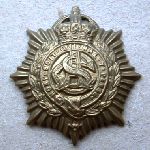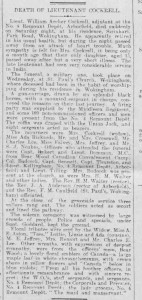William Cockrell. Died 11 November 1917
William married Jane Ashton in Eastbourne in the summer of 1884. Jane had lived in Poplar, London in 1881. Their daughter, Gladys Marion was born in April 1887 in Canterbury, Kent.
From the Reading Mercury Saturday 17th November 1917
“Lieut. William Archer Cockrell, adjutant at the No. 4 Remount Depot, Arborfield, died suddenly on Saturday night, at his residence in Park Road, Wokingham. He apparently retired in his usual health, but during the night passed away from an attack of heart trouble. Much sympathy is felt for Mrs. Cockrell, it being only a month ago that their only daughter aged 13, passed away after but a very short illness.
The funeral, a military one, took place on Wednesday, at St. Paul’s Church, Wokingham, where the deceased had been in the habit of worshipping during his residence in Wokingham.
A gun-carriage, drawn by six splendid black horses, with a mounted sergeant in charge, conveyed the remains on their last journey. A firing party was supplied by the Middlesex Regiment, and some 100 non-commissioned officers and men were present from the No. 1 Remount Depot The coffin was draped with the Union Jack, and eight sergeants acted as bearers. At the close of the graveside service three volleys rang out. The soldiers acted as escort and lined the pathway. The solemn ceremony was witnessed by large crowds of people. Police and specials, under Supt. Goddard, kept the ground.”
Many thanks to Peter Shilham and Jim Bell for their help in compiling this record
Name: COCKRELL Initials: W A
Rank: Lieutenant (Adjutant)
Regiment/Service: Army Service Corps
Unit Text: Remount Depot
Date of Death: 11/11/1917
Grave/Memorial Reference: In south-east corner. Cemetery: WOKINGHAM (ST. PAUL) CHURCHYARD
The Army Service Corps. 1914 – 1918
This section of the Long, Long Trail: ‘Note that the ASC is the same as the RASC: it received the Royal prefix in late 1918’. The unsung heroes of the British army in the Great War – the ASC, Ally Sloper’s Cavalry. Soldiers cannot fight without food, equipment and ammunition. In the Great War, the vast majority of this tonnage, supplying a vast army on many fronts, was supplied from Britain. Using horsed and motor vehicles, railways and waterways, the ASC performed prodigious feats of logistics and were one of the great strengths of organisation by which the war was won’. (admin: Ally Sloper was a cartoon character from the 1880’s, poking fun at the English, in much the same way as Alf Garnett and Andy Capp).
‘At peak, the ASC numbered an incredible 10,547 officers and 315,334 men. In addition were tens of thousands of Indian, Egyptian, Chinese and other native labourers, carriers and stores men, under orders of the ASC. Yet this vast, sprawling organisation – so vital to enabling the army to fight – merits just four mentions in the Official History of the war.
The Army Remounts Service
The ASC Remounts Service was responsible for the provisioning of horses and mules to all other army units. It was not a large part of the ASC, despite the huge numbers of animals produced, amounting in 1914 to only four Remount Squadrons that ran four Remount Depots (Woolwich, Dublin, Melton Mowbray and Arborfield).
A Remount Squadron consisted of approximately 200 soldiers, who obtained and trained 500 horses. They were generally older, experienced soldiers.
Animals were obtained during the war by compulsory purchase in the United Kingdom and by purchasing from North and South America, New Zealand, Spain, Portugal, India and China.
As the army expanded, several more ASC Remount Squadrons were established at home and overseas. ASC Remounts personnel in the Middle East theatres were supplemented by similar units of the Indian Army.
Organisation at home
During the war, four main Remounts Depots were established.
– Shirehampton (for horses received at Avonmouth)
– Romsey (for Southampton)
– Ormskirk (for Liverpool)
– Swaythling (a collecting centre for horses trained at the other three centres for onward shipment overseas).
A view of the immense scale of these operations can be judged from the statistics for Swaythling, as published in the “Times” in April 1919. Up to 1 April, it had received 342020 horses and mules (317165 from the USA; 6712 from Ireland; 9357 home purchased; 8856 returned from France). On that day, 3530 animals were stabled and cared for by a staff of 757 men’.
Many thanks to the ‘Long Long Trail’
‘Sirinhari’, Park Avenue, Wokingham.


